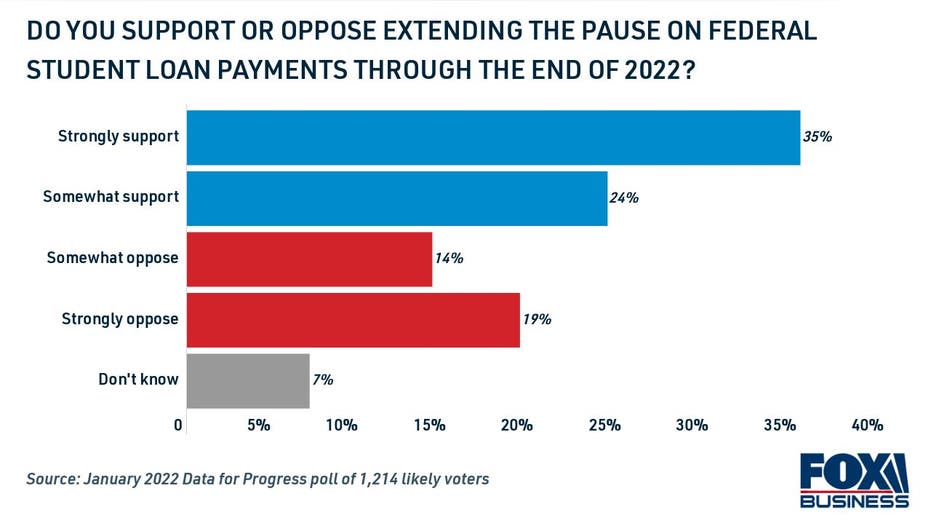Most Americans want student loan payment pause extended until 2023, poll shows
The current federal forbearance period expires on May 1, 2022

A January poll from Data for Progress found that 59% of Americans support extending the federal student loan payment suspension through the end of the year. (iStock)
Federal student loan payments are set to resume on May 1, after more than two years of COVID-19 emergency forbearance. However, most Americans believe that the student loan payment pause should be extended until 2023, according to a new poll from Data for Progress.
Fifty-nine percent of respondents supported extending student loan forbearance through the end of 2022, including 81% of Democrats but just 36% of Republicans. Adults under 45 were more likely (70%) to believe the payment pause should be extended than those ages 45 and up (53%).

STUDENT LOAN PAYMENT PAUSE HAS COST THE GOVERNMENT $100B
Despite the popularity of extending the federal student loan payment freeze, it's unclear whether the Biden administration will issue another extension. This means that federal student loan borrowers should expect to resume payments in a few short months.
Keep reading to learn more about the student loan forbearance extension, including how to prepare for the resumption of payments in May. One option is to refinance to a private student loan at a lower interest rate. You can compare student loan refinancing rates on Credible for free without impacting your credit score.
HERE'S WHO HAS QUALIFIED FOR STUDENT LOAN FORGIVENESS UNDER BIDEN
Will the student loan payment freeze be extended again?
Federal student loan payments and interest charges have been temporarily suspended since former President Donald Trump signed the CARES Act into law in March 2020. The Department of Education has extended forbearance several times under the direction of President Joe Biden, and student loan repayment is set to resume in May.
The student loan payment freeze has provided $5 billion per month in debt relief for 41 million borrowers, according to the Education Department. But the Biden administration has signaled that this will be the final student loan forbearance extension. The president said in a statement that the most recent extension was necessary "as we manage the ongoing pandemic and further strengthen our economic recovery."
"The Department of Education will continue working with borrowers to ensure they have the support they need to transition smoothly back into repayment and advance economic stability for their own households and for our nation."
3 STUDENT LOAN CHANGES IN 2022 THAT BORROWERS SHOULD KNOW ABOUT
While the poll showed that the current forbearance period has strong support from Democrats, it was found to be less popular among Republican voters. The vast majority (85%) of Democrats agreed with Biden's decision to pause federal student loan payments through May, but just 43% of Republicans felt the same.
Democratic lawmakers, including Sen. Elizabeth Warren and Senate Majority Leader Chuck Schumer, applauded the Biden administration's decision to extend the pause for student borrowers. Many progressives also used the opportunity to call on the president to deliver on his campaign promise of widespread student loan cancellation.
However, not all lawmakers were supportive of the latest forbearance extension.
Republican Rep. Virginia Foxx, who leads the Education and Labor Committee, said in a statement that the Biden administration is "neglecting its fiduciary responsibility to the American people," estimating that the most recent forbearance extension will cost taxpayers of $150 billion.
"President Biden’s latest extension is a troubling trend toward blanket student loan forgiveness, which would be a massive mistake, with major consequences for borrowers and taxpayers," Foxx said.
It's still unclear if the president will extend student loan forbearance again or enact widespread student debt forgiveness. If you're looking for ways to manage your student loan debt before payments resume in a few short months, you could consider refinancing for better terms. Refinancing your student debt to a lower interest rate may help you reduce your monthly payments, pay off loans faster and save money over time.
You can learn more about student loan refinancing by getting in touch with a knowledgeable loan expert at Credible.
BIDEN HAS CANCELED $15B IN STUDENT LOAN DEBT SINCE TAKING OFFICE
How to prepare for the end of student loan forbearance
If you're unprepared for the return of federal student loan payments in May, you could consider the following debt repayment strategies:
- Enroll in an income-driven repayment plan (IDR). Federal student loan borrowers can enroll in an IDR plan to limit their monthly student loan payments to 10-20% of their disposable income.
- Apply for additional federal forbearance. Federal Student Aid (FSA) offers up to 36 months of economic hardship or unemployment deferment.
- Refinance your student loans. Refinancing student debt to a longer loan term may save you more than $250 per month on your student loan payments, a Credible analysis found.
It's important to note that refinancing your federal student debt into a private student loan will make you ineligible for IDR plans, the current administrative forbearance period and select federal government student loan forgiveness programs.
You can browse current student loan refinancing rates from multiple lenders in the table below and use Credible's student loan refinance calculator to determine if this debt payoff method is right for your financial situation.
BIDEN ADMINISTRATION BEGINS NOTIFYING BORROWERS OF STUDENT LOAN SERVICER CHANGES
Have a finance-related question, but don't know who to ask? Email The Credible Money Expert at moneyexpert@credible.com and your question might be answered by Credible in our Money Expert column.




















